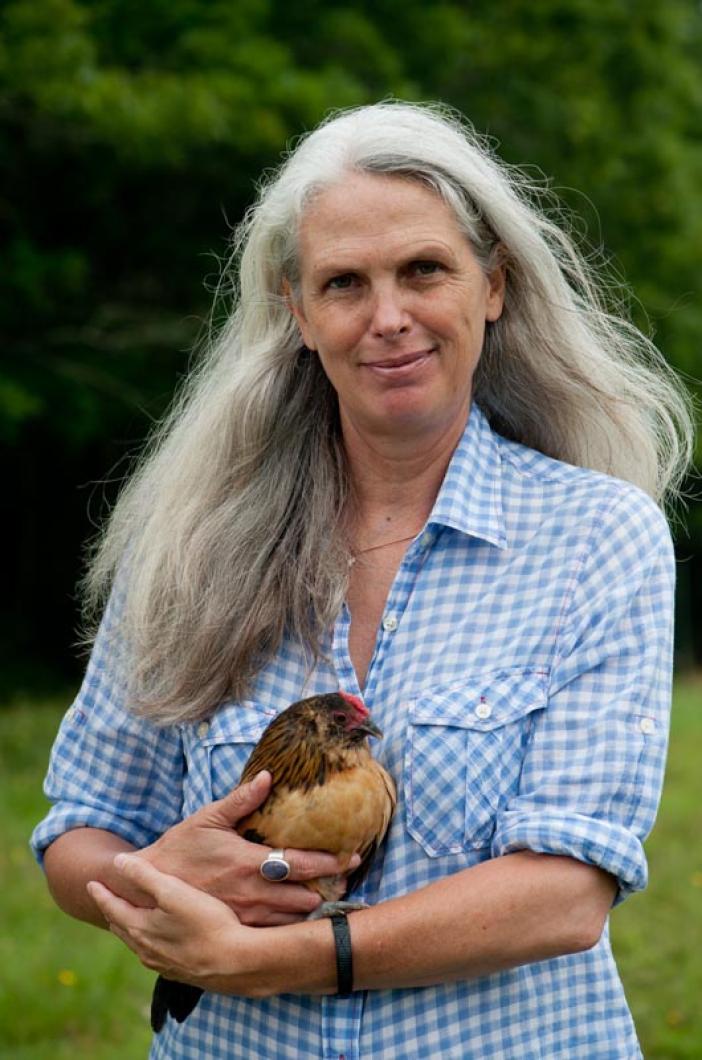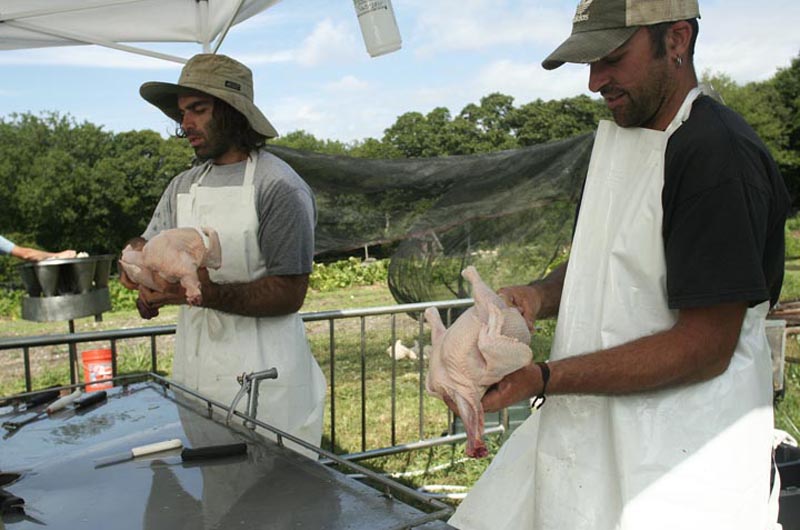One of the very first things Ali Berlow tells you is that she’s never killed a chicken. “I’ve never killed a chicken, and I never intend to,” she says matter-of-factly.
This may sound surprising coming from the author of The Mobile Poultry Slaughterhouse: Building a Humane Chicken Processing Unit to Strengthen Your Local Food System.
The book may not be the feel-good beach read of summer, but most likely it’s not what you’d expect from a title like that either. Beyond the introduction by noted animal activist Temple Grandin and cover blurb from Joel Salatin, the oversized paperback is a string of narrative chapters following one woman’s journey to develop a mobile poultry slaughterhouse for her community.
“Once you get past the word evisceration, there’s really nothing very gross about it,” Ms. Berlow said.
There will be a book signing at SBS on State Road in Vineyard Haven on Tuesday, August 6, from 6 to 8 p.m. and another reading at the Chilmark Library on August 28 at 5 p.m.
“Most things for me flow from the kitchen,” Ms. Berlow said. “It’s about what I feed my family . . . . My path was trying to get healthy, fresh, real-tasting chicken to serve at my table, not something filled with antibiotics and the fear of being slaughtered.”
Ms. Berlow is the founder of Island Grown Initiative and the former editor, now co-publisher, of Edible Vineyard. Though she contends, “I’m just a housewife,” she studied in East Africa, and curated at the Museum of Science in Boston and the California State Gem & Mineral Collection. She has also been a pioneer for Martha’s Vineyard’s slow food movement, and an essayist whose A Cook’s Notebook aired on numerous NPR stations, including a weekly stint for several years on WCAI/WNAN in Woods Hole.
But it was conversations with farmers, grocers, chefs and other parents that made her wonder how could they close the circle of food production. The more she talked, the more she was compelled to read, research and seek out people who could tell her about solutions. Laughing, she said, “I’m good on a computer, on the phone talking to people and looking for answers, then putting people together . . . Connecting the dots and drawing new constellations is the only way we’re gonna fix this broken food system. That’s why I’m so passionate.”
With her African scarves, biker boots and occasional piece of Lilly Pulitzer technicolor, Ms. Berlow seems an unlikely person to be on the front line of this issue. Except that “as a mother, that’s when I started looking at this . . . and the more I looked, both as sustenance for my children and potential poison . . . the more I dug, and then the more I wanted to know.”
Through Scott Lively, then the owner of Dakota Organic Beef, she traveled to watch a Kosher slaughter, considered the most reverent and humane way to harvest animals, and met his consultant Temple Grandin. It was Mr. Lively who provided the initial $10,000 donation for the Mobile Poultry Processing Unit.
Reading “geek agriculture journals,” Ms. Berlow learned of Bruce Dunlap, who built these units, and invited him to visit her home. Not long after, a PT Cruiser rolled off the ferry in Vineyard Haven hauling the Mobile Poultry Processing Trailer (MPPT).
In the past, local farmers would raise only around 250 birds for meat due to the cost — and stress on the chickens — of taking the birds off-Island. During the first season of the MPPT that number quickly grew to 3,000.
“Jefferson Munroe told me he wouldn’t have a farm if it weren’t for [the MPPT], because if there wasn’t a way to slaughter the chicken this way, it wouldn’t be economically viable,” Ms. Berlow said. “The unit fit both his ethical stance and the reality of what it costs to raise the birds.”
With an increasing number of people raising “yardbirds” for their own family’s consumption, the backyard farm movement is also taking root on the Vineyard. Last year over 10,000 chickens were raised, slaughtered, cooked and enjoyed by people on the Island.
“A farmer said to me, ‘Nobody really talks about the mobile slaughterhouse anymore . . . It’s here. It’s working. It’s transparent, even in the regulatory system.’ In just a few years, it’s become a part of the fabric of who we, the farmers, grocers, chefs and families of the Vineyard, are,” Ms. Berlow said. It’s also a part of who the Berlow family has become. Twenty-year-old son Max attends Warren Wilson University in Asheville, N.C., as a history major, but works at Mermaid Farm in the summers and “identifies as a farmer,” his mother reports. Recent Proctor Academy graduate Eli divides his time between the chicken crew and the Good Farm, and sees himself “more as a farm worker.”
Not the obvious path for two young men whose father runs the Font Bureau.
“You have to remember, the MPPT was in our driveway for years, and they grew up playing baseball and soccer around it,” said Ms. Berlow. “They had Joel Salatin at the table, watched Mama be stressed over different issues in the book, heard about Temple Grandin . . . . It’s given them a thoughtful knowledge of the process and what food means, and
that consideration has led them to action. It’s both amazing and thrilling to see how it’s taken root.”
Over a decade later, it’s also grounded Ms. Berlow’s writing aspirations. An essayist and cook, she merged her narrative style into a volume designed to empower others and make the inconceivable not just plausible but “do-able.”
“Part of this is education for the consumer as much as the people bringing the trailer into their community. Why local chicken costs more, and the way to get the most out of that bird! There are recipes as part of the book to show people how to get the most out of that bird, right down to the best stock you’ll ever taste.
“And it’s also about how to face the challenges that come with doing this, things most people never consider. It’s understanding what the regulators are looking for, and how to speak with them . . . It’s about knowing how to deal with the post-slaughter clean-up.”
In the process of working on her book, she also came to an even better understanding of how squeamish this topic makes the lay reader. “There was a lot of changing the subject, a lot of ‘oh, that’s interesting . . .’ and side-stepping.”
While understanding most people prefer “their chicken on a diaper in the grocery store,” Ms. Berlow believes the more we know, the more we will appreciate the food we eat.
Invoking Michael Pollan, author and seasonal resident of the Vineyard, she explained, “As Michael would say, ‘You can give a chicken a great life, and it ends in a very horrible day . . . ’ The point of the MPPT is to let that bird have a very decent, very respectful last day.”
Ms. Berlow is already into the first draft of her next book about empowering people to get involved in their food system. “There are so many great programs around the country addressing very different issues, some in very creative ways.”
“Access to better food for more people, that’s what my second book, which is due in 2014, is about. Again, it comes down to empowerment, individually, and at the town, city and state levels. The more you know, the greater difference you can make in your community . . . and that’s what I’d like my books to provide, the information to put the power of ideas in the reader’s hand.”









Comments (2)
Comments
Comment policy »